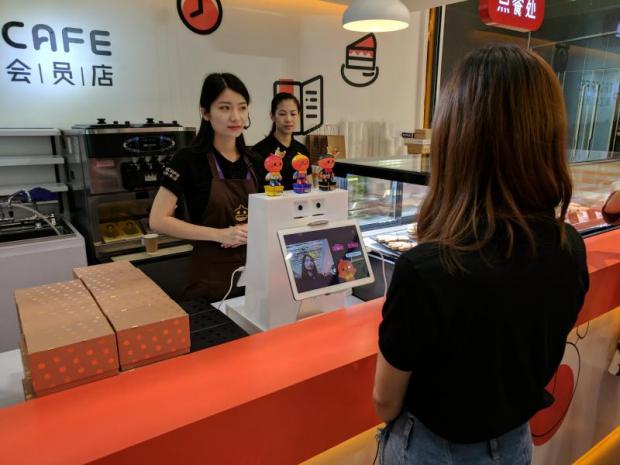
HANGZHOU, CHINA - Alibaba Group, China's biggest e-commerce firm, has demonstrated an experimental cashless cafe, empowered by artificial intelligence and data technologies through the use of the Alipay e-payment service.
The company selected local merchants' products from Taobao, the largest mobile consumer-to-consumer (C2C) marketplace in China, which the group operates, to sell through its affiliate Lazada, Southeast Asia's largest e-commerce platform. Alibaba said last month it was investing another US$1 billion in Lazada to raise its stake above 80%.
"The Tao Cafe, an experimental cashier-less and cashless coffee shop, is another feature for Alibaba to outline its technology capability bridging the world of offline and online shopping," Chris Tung, chief marketing officer of Alibaba Group, told reporters at the second annual Taobao Maker Festival.
The event has transformed the Hangzhou International Expo Center into a bustling street market showcasing products from young entrepreneurs on the Taobao platform.
At the Tao Cafe, users of the Taobao app scan a QR code in front of the shop where a camera armed with face recognition detects their identity. The data links to their Taobao accounts so they can buy a cup of coffee using voice-recognition technology, after which the beverage will be brought to their table.
While they wait, they can shop online using either their smartphone to access Taobao or an interactive desk that shows all of the coffee-related products for sale in the shop. All purchases will automatically be deducted from their Taobao account, which is linked to Alipay, meaning they can leave with their new buys without having opened their wallet.
Alibaba's artificial intelligence and data technologies, notably its voice- and image-recognition software, have effectively got rid of both queuing and cash in the context of this store.
"This is one example where Alibaba can provide its technology to improve users' experience to retail shop," Mr Tung said.
He said millennials make up the bulk of buyers on Taobao Marketplace, the C2C platform, while figures show that 26% of sellers were born in the 1990s. Such aspirational consumers and entrepreneurs tend to prefer original products with individuality and quality, he added.
Mr Tung said the Taobao app has 189 million active users as of this May, as well as hundreds of millions of products and service listings.
"The successful merchants are the ones who provide quality and creativity, which makes them stand out from the crowd of shops on its platform," he said.
"And with the technology of big data analytics, the future of the C2C marketplace will be tailored for a more personalised experience."
The company has selected a number of best-selling merchants from Taobao to sell via the Lazada platform. The so-called Taobao Collection was launched in Singapore in March with some 4 million products from Taobao initially available (http://taobao.lazada.sg).
The collection started in Malaysia last month and will be rolled out soon in Southeast Asia including Thailand.
"We will target SMEs, young people, and female entrepreneurs -- three powerful group to change the world," Jack Ma, executive chairman of Alibaba Group, said in a speech at the Global Conference on Woman and Entrepreneurship.
Mr Ma praised the fairer sex as being one of the secret successes of Alibaba, a high-tech company where women make up 47% of the workforce. Some 34% of senior management are female, as well as six of Alibaba's 18 founders.
"Women rely more on the right side of the brain which deals with intuition, detail-oriented work and also determination. They are tolerant and persistent," Mr Ma said.
"They also focus on customer experience more than men, who mostly use the left side of the brain, which is more rational and fact-based. Artificial intelligence can assist people with these kinds of tasks, but customer experience cannot be done by a machine."
He said businesses no longer compete in terms of scale but are more focused on building a "small but great" company. Woman entrepreneurs are among Alibaba's key target users.
"By leveraging the power of the internet, 40% of Alibaba's sellers are now women," he said. "Platforms like Taobao enable women to operate their own business."
Women also settle their accounts faster than men, on average, he said. According to the company's big data analysis, women tend to buy diapers and food for other family members whereas men like to shop for themselves, whether it be a car, video game or electronic device.
"Woman will truly drive change in business, politics, society and the world," Mr Ma said.
"We are looking to create a mechanism that offers women loans and capital so they run their own businesses easier. This will help solve an issue faced by many women where they feel challenged at work but are poorly paid with limited job options," he added.